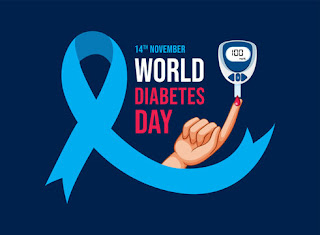Access To Diabetes Care
One of my primary duties each morning is that of checking my parents' blood glucose levels and recording the readings. My dad has Type 1 Insulin dependent diabetes while mom has Type 2 diabetes. The management of diabetes is not a walk in the park. Like all non-communicable diseases, diabetes requires commitment and a dogged perseverance in order to remain as healthy as possible. The management of diabetes also requires a support system in order to navigate the hurdles that are associated with this lifestyle disease. Every November 14, World Diabetes Day is commemorated. This is an opportunity to raise awareness about the impact of diabetes on the health of people and to highlight the opportunities to strengthen the prevention, diagnosis, and treatment of diabetes. The theme for World Diabetes Day is Access to Diabetes Care. The emphasis on this World Diabetes Day will be on the need for equitable access as an essential element to the care and management of diabetes. The day is set aside to raise awareness of ways people with diabetes can minimize their risk of complications. Activities will also celebrate the experiences of people with all forms of diabetes to help those impacted to take action, including seeking and obtaining essential care.
What Is Diabetes?.
Diabetes is a chronic disease, which occurs when the pancreas does not produce enough insulin, or when the body cannot effectively use the insulin it produces. This leads to an increased concentration of glucose in the blood (hyperglycaemia). Type 1 diabetes (previously known as insulin-dependent or childhood-onset diabetes) is characterized by a lack of insulin production. Type 2 diabetes (formerly known as non-insulin-dependent or adult-onset diabetes) is caused by the body’s ineffective use of insulin. It often results from excess body weight and physical inactivity. Gestational diabetes is hyperglycaemia that is first recognized during pregnancy. There are approximately 422 million adults living with diabetes this according to the United Nations. The global prevalence of diabetes has nearly doubled since 1980, rising from 4.7% to 8.5% in the adult population. This reflects an increase in associated risk factors such as being overweight or obese. Over the past decade, diabetes prevalence has risen faster in low and middle-income countries than in high-income countries. Unfortunately, diabetes is a major cause of blindness, kidney failure, heart attack, stroke and lower limb amputation. Healthy diet, physical activity and avoiding tobacco use can prevent or delay type 2 diabetes. In addition diabetes can be treated and its consequences avoided or delayed with medication, regular screening and treatment for complications.
Important Facts about Diabetes.
Type 1 diabetes is not preventable. However, type 2 diabetes is often preventable through a healthy diet, regular physical activity, maintaining normal body weight, and avoiding tobacco use. Diabetes is a major cause of blindness, kidney failure, heart attacks, stroke, and lower limb amputation. Diabetes can be treated and its complications avoided or delayed with regular screening and treatment. People with diabetes should seek regular screening for complications to aid in early detection. This includes screening for kidney disease, regular eye exams, and foot assessment. Quitting smoking reduces the risk of developing Type 2 diabetes by 30-40%. Diabetes is associated with about twice the risk of tuberculosis (TB) disease and a higher risk of multidrug-resistant TB. People with both TB and diabetes are twice as likely to die during TB treatment and have twice the risk of TB relapse after treatment completion. Did you know that only about 50% of people with type 1 diabetes get the Insulin they need, often because their country’s health systems cannot afford it? The staggering cost for both controlled and uncontrolled diabetes continues to be problematic. The Economic Report, which is published every five years, found that the total annual cost of diabetes in 2022 is $412.9 billion, including $306.6 billion in direct medical costs and $106.3 billion in indirect costs. People with diagnosed diabetes now account for one of every four health care dollars spent in the United States of America.
As the international community observes World Diabetes Day we are mindful of the Caribbean region in which we live and the impact diabetes has on Caribbean citizens. The Trinidad-based Caribbean Public Health Agency (CARPHA) in a recent statement said that diabetes remains a major health concern in the Caribbean region, affecting millions of people and burdening healthcare systems.
According to CARPHA the Caribbean has one of the highest prevalence rates of diabetes in the world, with many individuals unknowingly living with the condition. On this World Diabetes Day take the time out to check your status. Knowledge is key in managing diabetes.
Wayne Campbell is an educator and social commentator with an interest in development policies as they affect culture and or gender issues.
waykam@yahoo.com
@WayneCamo
©
#WorldDiabetesDay



Comments
Post a Comment